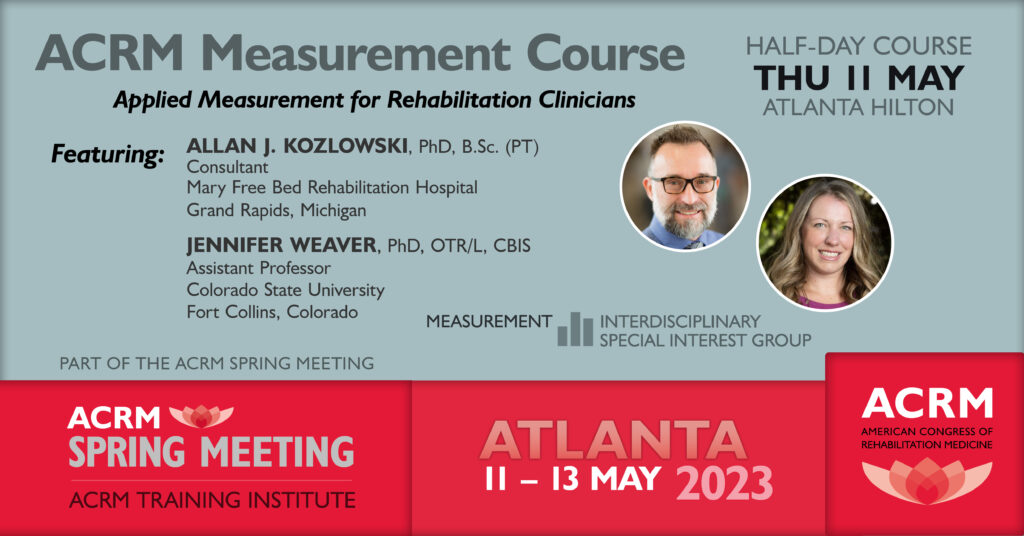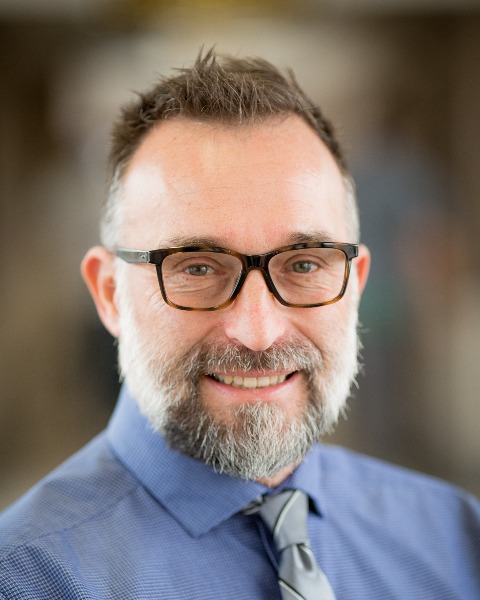Applied Measurement for Rehabilitation Clinicians Course
Open to All Registered Attendees!
ACRM’s Applied Measurement for Rehabilitation Clinicians Course provides clinicians with an evidence-based approach to effective and efficient measurement in support of clinical, administrative, and patient-centered decision-making.
Clinicians are tasked with documentation and administrative tasks in addition to their clinical responsibilities. Consequently, any measurement activity should support clinical decision-making, meet or exceed compliance with an administrative or regulatory requirement, or both.
This course has great value in developing new skills and building on current skills. This course is especially great for OT, PT, and SLP.
Course Benefits
Up-level your measurement skills
Apply a step-by-step process to critically appraise the needs and preferences for measurement to support clinical, administrative, and patient-centered decision-making.
Critically appraise your measurement practices to enhance clinical and administrative decision-making
Evaluate the relationship between an instrument for a specified ‘construct of interest’ and to its application in clinical practice
Join internationally-recognized industry leaders
- Ask us about CME/CEU availability for this course

Presenters

Allan J. Kozlowski, PhD, B.Sc. (PT)
Consultant
Mary Free Bed Rehabilitation Hospital
Grand Rapids, Michigan, United States
Jennifer Weaver, PhD, OTR/L, CBIS
Assistant Professor
Colorado State University
Fort Collins, Colorado, United States
This course provides step-by-step procedures to guide clinicians through a critical appraisal of their measurement needs and preferences within their unique clinical and administrative environment. This step-by-step approach can be applied and tailored to the practice setting of any rehabilitation professional who has a clinical need or administrative requirement to make diagnostic decisions, establish prognoses, guide patients to set goals, or to measure and evaluate their outcomes. Skills developed through the course may also facilitate discussion and planning with patients, their care partners, and their family members.
Date: 11 May 2023
Time: 8:30 AM - 12:30 PM
Location: Room 206
Who Should Attend
ALL rehabilitation professionals who want to make efficient measurement choices in their practice to support effective decision-making, including but not limited to
- Occupational therapists
- Physical therapists
- Speech-language Professionals
- Nurses and Nurse Practitioners
- Neuropsychologists
- Clinical and Rehabilitation Psychologists
- Rehabilitation, Vocational, and Mental Health Counselors
- Physicians and Physician Assistants
- Prosthetists and Orthotists
- Music Therapists
Course Description
The half-day Applied Measurement course provides clinicians with a brief overview of a clinically focused measurement framework before walking participants through an applied example of the step-by-step critical appraisal process. Steps include appraisal of (a) the clinician’s measurement needs and preferences within their unique practice setting, (b) the construct(s) related to their measurement needs and preferences, (c) instruments designed to measure the construct(s) of interest, (d) strengths and limitations of selected instruments, and (c) positive and negative consequences arising from decision-making. In addition to clinical decision-making, the course addresses facets of measurement for patient goal setting and administrative and regulatory requirements. In the second half of the course, participants will break into small working groups to apply measurement concepts by using a stepped appraisal procedure for one measurement issue within their practice. Course participants will leave with a measurement toolkit designed to replicate the appraisal procedure to address future measurement decisions (e.g., selection and application of assessments) in their practice setting.
Learning Objectives
Following the course, participants will be able to
- Describe the main components of the measurement framework.
- Delineate the concept of a ‘construct of interest’ as it relates to specific populations and practice settings.
- Evaluate the relationship between an instrument for a specified ‘construct of interest’ and to its application in clinical practice
- Search for and appraise instruments for use in their practice setting
- Apply a step-by-step process to critically appraise the needs and preferences for measurement to support clinical, administrative, and patient-centered decision-making.




